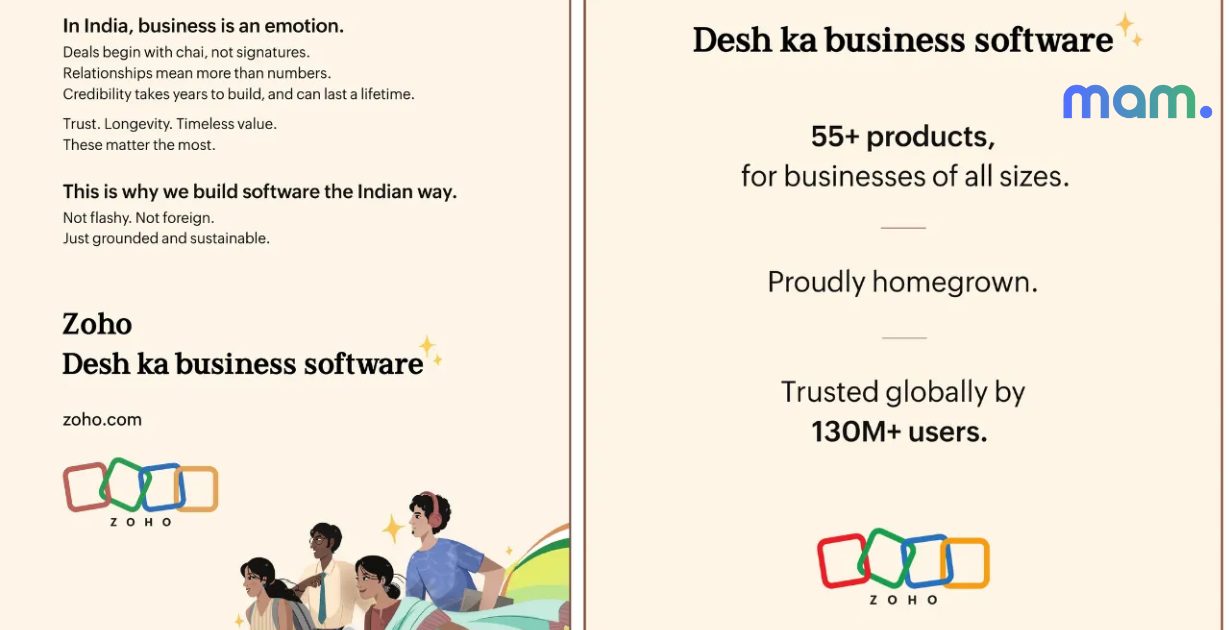At a time when India’s digital economy is embracing swadeshi innovation, Zoho Corporation is proudly highlighting its Made-in-India identity. The company’s latest front-page ad in The Times of India celebrates Indian business values, authenticity, and emotional intelligence — setting itself apart from “flashy” foreign tech giants.
Zoho’s Campaign: Celebrating Indian Business Culture
The striking ad copy positions business in India as an emotion, stating that “deals begin with chai, not signatures” and that “relationships mean more than numbers.” This messaging connects deeply with Indian entrepreneurs who value trust, relationships, and long-term collaboration over short-term gains.
By emphasizing being “grounded and sustainable,” Zoho paints itself as a homegrown alternative to global software giants like Microsoft and Google. The campaign’s tone reflects confidence, authenticity, and a quiet pride in being Indian — aligning with the government’s current swadeshi and self-reliant narrative.
Arattai and Zoho’s Expanding Ecosystem
The campaign follows the beta launch of Arattai, Zoho’s own messaging and calling app. Designed as a secure, easy-to-use platform for Indian users, Arattai represents Zoho’s growing ambition to build a complete Indian tech ecosystem, spanning communication, productivity, and business management tools.
This move arrives at a crucial time — when digital sovereignty, data protection, and homegrown innovation are increasingly part of India’s public and policy conversations.
Government Support Boosts Swadeshi Momentum
Zoho’s patriotic positioning aligns perfectly with the Indian government’s swadeshi push. Recently, several ministries and public departments have begun exploring or adopting the Zoho Office Suite for official use.
This endorsement is significant. It not only strengthens the company’s reputation as a reliable, Indian-made software provider but also showcases India’s capability to produce world-class enterprise solutions that can compete globally.
The campaign’s timing also coincides with a growing policy-level emphasis on domestic alternatives — especially following global trade tensions like former U.S. President Donald Trump’s 50% tariff on Indian imports. Against this backdrop, Zoho’s message becomes more than advertising; it becomes a statement of national and business pride.
Addressing Questions About Privacy and Trust
While the response to Zoho’s ad has been largely positive, some conversations on social media have centered around Arattai’s data privacy and encryption policies. Users have questioned whether the app offers end-to-end encryption and if Zoho would share customer data with authorities if required.
Zoho, known for its strong privacy stance, has historically maintained that it does not sell user data or rely on ad-based business models — a key differentiator from many foreign competitors. As the debate evolves, this transparency could strengthen user trust even further.
Marketing Takeaway: Desi Branding That Resonates
Zoho’s “Proudly Indian” campaign is more than patriotic marketing; it’s strategic storytelling. By combining emotion, culture, and timing, Zoho positions itself as India’s trusted technology partner — not just for businesses, but for the nation’s digital future.
With the government backing local tech solutions and consumers growing more conscious about data sovereignty, Zoho’s desi identity feels both authentic and relevant. The brand’s ad is not merely a declaration of origin; it’s a reaffirmation of confidence in Indian innovation.
In a marketplace filled with global competition, Zoho proves that sometimes, being deeply rooted in India is the most powerful global strategy of all.





